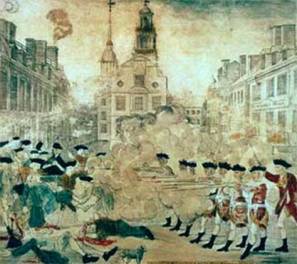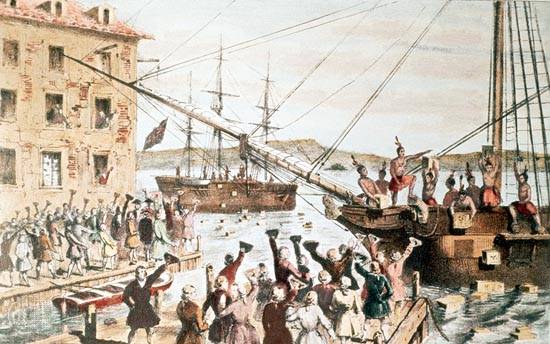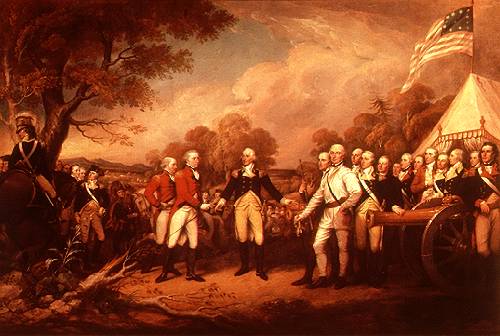Chapter 17 European Revolutions of Society and State, 1714-1815
Section 3
While in Europe the Enlightenment remained largely an elitist movement,
British colonists in North America particularly developed Enlightenment
political ideas along more democratic lines. Strongly influenced by the
political views of John Locke and Rousseau, and caught up in the global
struggle between Britain and France, the colonists in North America
began to experience a new sense of national identity that led to
revolution and the establishment of a new nation.
Changes in British North America
The Seven Years' War had done more than redistribute the balance of power in Europe. Even as the British were taking control of a new empire in India, they began to lose control over their old empire in North America. After nearly two centuries of settlement in America, the colonists had begun to see themselves as a people separate from the British.
A new American identity. There were many reasons for the emergence of a new American identity in the colonies. For one thing, the environment in which the colonists lived was very different from Britain. Land was plentiful in the colonies. By working hard on their own land, colonists could gain wealth and social standing. In Britain, wealth and social standing were determined by birth and privilege. In addition, Britain had paid little attention to the colonies in their formative years, which allowed the colonists to develop self-government.
Because they were allowed a voice in their local affairs, British colonists in North America had come to believe that “representation” in government meant that a group directly elected its own representatives. In Britain, however, the idea of "virtual representation" prevailed. This meant that anyone could represent the interests of a particular group without being elected by it. Although the differences between the Americans and the British grew over many years, it was British imperial policy that brought these differences into sharp focus.
British imperial policy. The Seven Years' War had left the British government deeply in debt. Since British troops had fought in North America to protect the colonists, the government felt justified in requiring the colonists to help pay for their own defense. In addition, after the war Britain began to consolidate its far-flung trading interests and colonial territories into a coherent imperial organization. Soon, the British government tried to bring all its colonies under closer economic control by enforcing mercantilist trade regulations. Used to the old days of relative neglect, many colonists saw the imposition of new taxes and restrictions as an unjust and arbitrary restriction of their liberties. As the colonists resisted British policies, the British king, George III, became even more determined to force them into obedience.
Colonial Response
One of the ways in which the British tried to gain more control over the colonies was through taxation. In 1765[cxxii] Parliament passed the Stamp Act, which required colonists to pay a tax—in the form of special stamps—on many paper goods, including newspapers, wills, mortgages, contracts, and playing cards. The colonists united in opposition to this tax, particularly because they had not been consulted before the tax was imposed. “If Great Britain can order us to come to her for necessaries we want,” complained John Dickinson,[cxxiii] a Philadelphia lawyer," and can order us to pay what taxes she pleases before we take them away, or when we land them here, we are as abject slaves."[cxxiv] After the colonists began a trade boycott of British goods, Parliament repealed the Stamp Act.
But crisis seemed to follow crisis in the colonies. After the British had sent troops to keep the peace in Boston, on a cold winter evening in 1770[cxxv] an angry mob of colonists began throwing ice and snowballs at British soldiers outside of a customhouse. Fearing for their safety, the guards fired into the crowd, killing several people. The incident became known as the Boston Massacre and fueled colonial outrage against the British.

The Boston Massacre,
March 5, 1770. Taken from http://www.bostonmassacre.net/images/new_pic6_med.jpg
Tensions increased further in 1773, when the British government attempted to save the British East India Company from bankruptcy by in effect granting the company a monopoly over the tea trade in the colonies. When angry colonists threw a shipment of tea into Boston Harbor---an event that became known as the Boston Tea Party—the British closed the port of Boston to all shipping.

In 1774[cxxvi] delegates from all colonies but Georgia met in Philadelphia in the First Continental Congress to discuss the situation. The delegates demanded that they be granted the full rights of British subjects. In April 1775,[cxxvii] however, British troops marched from Boston to seize guns and gunpowder that colonists had stored in two nearby towns. At Lexington and Concord, the British met armed resistance from the colonists and retreated to Boston.
The Struggle for Independence
Even after blood had
been shed, the colonists, hoping to find a peaceful solution, did not at
first seek independence. Gradually, however, they began to believe that
they must break free of Britain to safeguard their rights. In early 1776[cxxviii]
a recent British immigrant, Thomas Paine,[cxxix]
published a pamphlet called Common
Sense:
“I challenge the warmest advocate for reconciliation to show a single advantage that this continent can reap, by being connected with Great Britain. . . .
But the injuries and disadvantages we sustain by that connection
are without number. . . . Any
submission to, or dependence on, Great Britain, tends directly to
involve this continent in European wars and quarrels, and sets us at
variance with nations who would otherwise seek our friendship, and
against whom we have neither anger nor complaint.”[cxxx]
Common Sense sold some 120,000 copies in only three months, and
helped transform a haphazard rebellion into a crusade for independence.
People in the colonies began to divide over the issue of independence.
About one third of the delegates, called loyalists
or Tories, opposed independence. Another third, called patriots, actively favored independence. The rest remained
undecided. As enthusiasm grew, however, on July 4, 1776,[cxxxi]
the delegates to the Second Continental Congress adopted the Declaration
of Independence, which established the United States of America as
an independent nation.
The Declaration of Independence. Drafted by the Virginian Thomas Jefferson,[cxxxii] with the editorial advice of Benjamin Franklin of Pennsylvania and John Adams of Massachusetts, the Declaration of Independence clearly showed the influence of the Enlightenment. Drawing heavily on the ideas of John Locke, Jefferson asserted in the Declaration that: “all men are created equal, that they are endowed by their Creator with certain unalienable Rights, that among these are Life, Liberty, and the pursuit of Happiness.” No government could exist without the consent of its citizens, the Declaration insisted, because citizens created governments to protect individual rights. If a government failed to protect people's rights, then the people had the right to alter or abolish it.
In the first draft of the declaration, Jefferson had also
denounced slavery, and accused King George III of violating the
"sacred rights of life and liberty" of blacks by
"captivating and carrying them into slavery in another
hemisphere."[cxxxiii]
As other slaveholders from the southern colonies objected
vigorously to any attack on their rights as “property owners,”
however, delegates removed the passage from the declaration in order to
get slaveholders’ approval.[cxxxiv]
Thus, the ideal of individual liberty was only applied in a
limited manner. Neither women nor slaves were included in the provisions
of the Declaration of Independence.
The War of Independence. The American Revolution soon became part of the ongoing rivalry between Britain and France. At the outset of the war, the patriots were at a decided disadvantage. They had little money to finance the war, and their army at first consisted of poorly trained volunteers. British troops, on the other hand, were well trained and disciplined, and the British navy was the strongest in the world. However, the colonists were fighting for their own homes in territory they knew well. They also trusted their leader, General George Washington of Virginia,[cxxxv] a commander whose experience and judgment inspired confidence.
For Britain, waging war from across the ocean was both difficult and expensive. Because the British people had long refused to allow a large standing army, the king had to hire mercenaries. British soldiers also had to get most of their supplies from Britain.[cxxxvi] In addition, communications were difficult. Messages commonly took two months to cross the ocean.[cxxxvii] Finally, public opinion in Britain was not solidly behind the war.
Most of the fighting in the Revolution took place between 1776
and 1781.[cxxxviii]
The Battle of Saratoga[cxxxix]
in 1777,[cxl] in which the patriots
surrounded and defeated a British army, was a significant turning point.
The outcome of the battle convinced the French to make an alliance with
the colonists. After the French alliance, Spain and the Netherlands also
joined the war against the British.

![]()
“On October 17, 1777, following a defeat at the second Battle of Saratoga, British General John Burgoyne surrendered to American General Horatio Gates at Saratoga, New York. The surrender, depicted here in a painting by John Trumbull, encouraged France to join the American side and was thus a turning point in the American Revolution.” Picture and caption taken from http://images.encarta.msn.com/xrefmedia/sharemed/targets/images/pho/t001/T001749A.jpg
France's intervention, particularly at sea, was crucial in achieving an eventual American victory in the war. In the fall of 1781, a French fleet prevented the British navy from re-supplying the land forces of General Charles Cornwallis. Consequently, in October 1781[cxli] the British suffered a disastrous defeat by the combined American and French forces at Yorktown, Virginia. By this time the British people were tired of the costly American war. In 1783 the War of Independence ended with the signing of the Treaty of Paris. The Americans won not only independence but also a territory much larger than the original 13 colonies, including all territory east of the Mississippi River and north of the 31st parallel.
Forging a Nation
In 1781[cxlii] the American states established a government under the Articles of Confederation, a plan that the Second Continental Congress had adopted in 1777.[cxliii] The central government was deliberately make weak in order to avoid any abuse of centralized power and to allow the states to control most of their own affairs. This government lasted only until 1789,[cxliv] however.
In 1787[cxlv] it was clear that the Articles of Confederation did not provide a government that was strong enough to endure. Delegates from all the states, except Rhode Island, met in Philadelphia to draw up the United States Constitution, the plan for a stronger, more effective government. They crafted a federal system of government,[cxlvi] which divided powers between the central government and the state governments. In addition, power within the federal government was divided between three separate and independent branches: the executive, the judicial, and the legislative.
Some states were reluctant to ratify the Constitution because it did not offer greater protection to individuals. In 1789[cxlvii] the first Congress of the United States wrote the Bill of Rights, the first 10 amendments to the Constitution. The Bill of Rights, ratified in 1791,[cxlviii] specifically guaranteed the basic rights of every citizen, including freedom of religion, speech, press, assembly, and petition. These rights were spelled out so that no question could arise as to their limitation by governmental power.
Despite its apparent endorsement of Enlightenment ideals, the democracy that the Americans achieved in 1789 was very different from democracy as we think of it today. In their individual constitutions, the states restricted voting to free, adult males, usually to those who owned property. Women could not vote, and the large slave population had no political rights at all. Yet while many liberties still had to be won, the American experience inspired people in other parts of the world who opposed domination by absolute monarchy and the privileged classes.
Section 3 Review
IDENTIFY and explain the significance of the following:
Stamp Act
loyalists
patriots
Boston Tea Party
First Continental Congress
Second Continental Congress
Declaration of Independence
George Washington
Treaty of Paris
federal system
Bill of Rights
LOCATE and explain the importance of the following:
Boston
Philadelphia
Lexington and Concord
Saratoga
Yorktown
1.
Main Idea What
factors contributed to the colonists' decision to declare independence
from Great Britain?
2.
Main Idea How
was the form of government established by the U.S. Constitution
different from European governments at the time?
3.
Geography: Place What
advantage did geography give the American colonists in the War of
Independence?
4. Synthesizing Consider the following statement: The U.S. government was founded upon the principles of the Enlightenment. In a short essay, give three examples of why this statement is true and two examples showing its limitations.